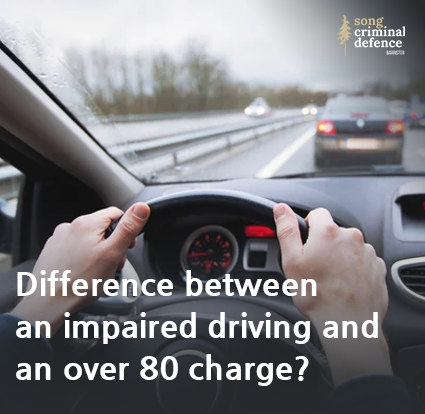Song Criminal Defence
Frequently Asked Questions (FAQs)
Impaired Driving

Q: What is the difference between an Impaired Driving and an Over 80 charge?
Without using "legalese" to describe the difference between an Impaired Driving and an Over 80 charge, Impaired Driving is based on observation of driving behaviour and Over 80 is based on the reading given by a breathalzyer that an accused person blows into at the station.
Q: What is Impaired Driving?
The offence of "Impaired Driving" is based on driving behaviour or the "aftermath" of driving behaviour that would suggest to an independent observer that the driver of the vehicle was impaired. For example, this could consist of weaving in between the lines of the lane, driving too quickly or too slowly, not following traffic rules, not obeying traffic signs, an accident, or anything else that could suggest to the observer that the driver was impaired.
Q: What is Over 80?
The offence of "Over 80" denotes that an accused person's breath reading is at or above 80mg of alcohol in 100mL of blood. These readings are obtained by a breathalyzer machine employed at the police station into which the accused person blows into twice separated by around 20 minutes between samples. The breathalyzer, usually the Intoxiliyzer 8000C, is operated by a trained police officer that is referred to as a qualified breath technician.
Same Punishment
Despite these differences in the offence, the consequences of a conviction to either Impaired Driving or Over 80 are exactly the same.
Most people are charged with both Impaired Driving and Over 80
Most people end up being charged with both Impaired Driving and Over 80 as one charge often times follows the other in terms of the facts of the case. Meaning, if an accused person is stopped and arrested for impaired driving, they will most likely also be taken to the station to provide two breath samples. If one fails the breath test (has a BAC over 80mg), they would subsequently be charged with Over 80.
You can't be convicted of both Impaired Driving and Over 80
You can't be convicted of both Impaired Driving and Over 80 because of something known as the "Kineapple Principle" otherwise known as "Double Jeopardy" to our American neighbours to the south. It's basically a rule against multiple convictions that arise out of the same cause or matter. In other words, you should not be punished twice for doing one thing.
To paraphrase Justice Laskin in R. v. Barnes (1991), accused persons should not be subjected to more than one conviction arising out of the same "case or matter or delict" made up of one single criminal act committed where the facts (and elements) of what happened are substantially the same.
This means that if an accused person is charged with both Impaired Driving and Over 80, they can only be convicted of either or and not both. So, if an accused person decides to enter a guilty plea, the Crown and Defence Counsel will usually decided which offence to enter a plea to.
Is there a difference in entering a plea to either Impaired Driving or Over 80?
The short answer is "it depends". Before going any further, most accused individuals don't seem to care which offence they enter a plea to when they learn that the consequences are exactly the same. Having said this, pursuant to s. 606 of the Criminal Code of Canada, an accused person needs to be able to admit to the facts that would be read out in Court when entering a guilty plea. The existing evidence may be stronger in support of a plea to one charge versus the other. There are "suggestions" out there positing that an Over 80 conviction may "look" better on a driving record or a criminal record to organizations that have an interest in such things like car insurance companies and foreign countries. This remains to be determined.
Even though you can't be convicted of both Impaired Driving and Over 80, you can still be found guilty of either after a trial.
Since the what constitutes Impaired Driving and Over 80 are different, what the Crown is required to prove may be different as well. Therefore, if the Crown fails to prove "the elements" (what they are required to prove beyond a reasonable doubt) for one charge, the Crown may still be able to prove the elements of the other. For example, the Crown may not be able to prove the Over 80 charge because of something that was done incorrectly by the police. However, the Judge may still find the accused person guilty of Impaired Driving because the testimony of the independent witness of the driving behaviour was found to be credible.
If you still have questions, please feel free to reach out to Song Criminal Defence. We are more than happy to speak with you and answer any questions you might have about Impaired Driving and Over 80 charges.
